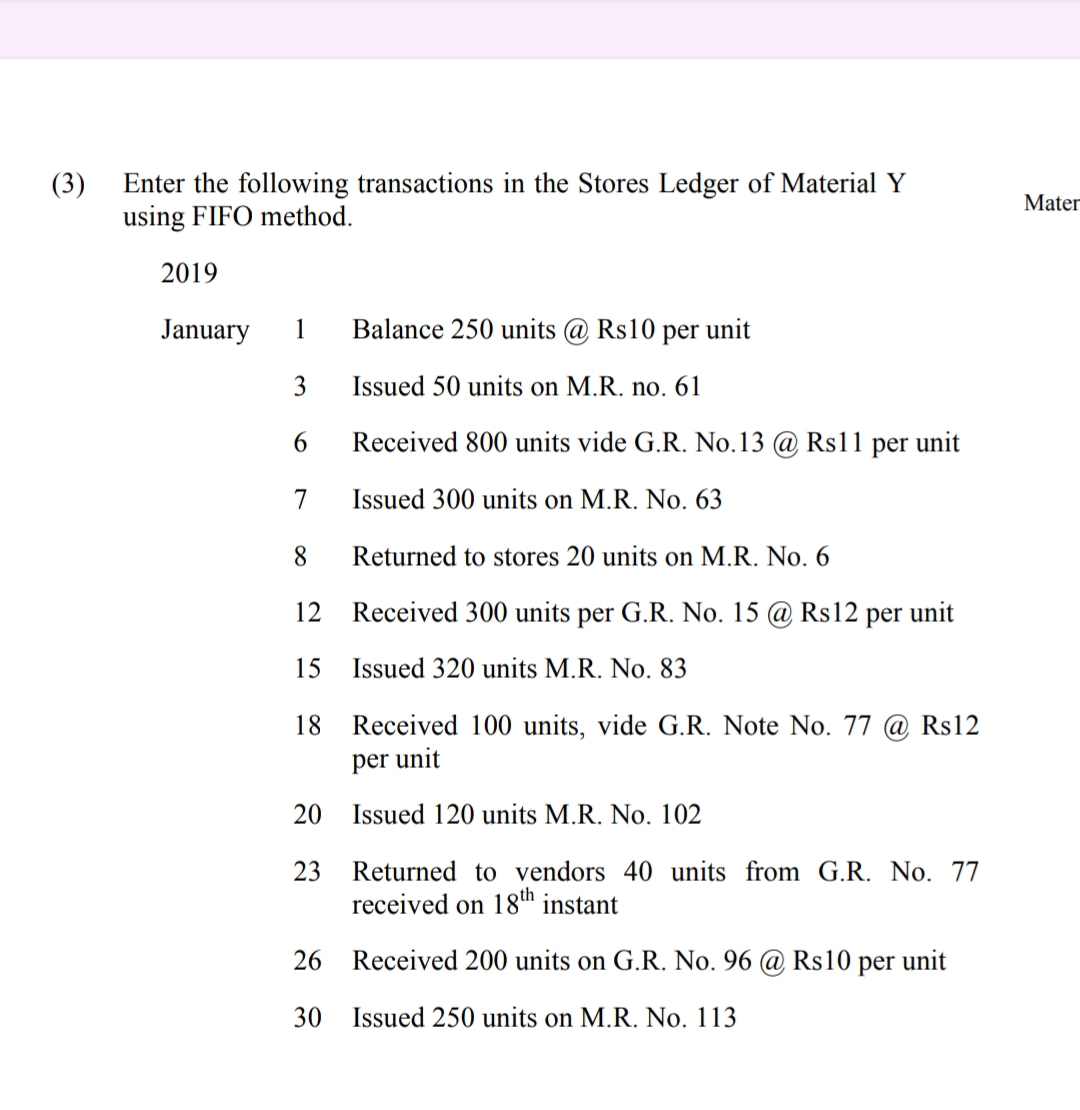Enter the following transactions in the Stores Ledger of Material Y using FIFO method.

Understand the Problem
The question is asking to enter a series of inventory transactions into a Stores Ledger for a specific material using the FIFO (First-In, First-Out) method. This involves tracking the quantities and prices of units as they are issued and received.
Answer
Final Ledger: 230 units @ Rs 11/unit, 60 units @ Rs 12/unit.
Answer for screen readers
The final balances in the Stores Ledger for Material Y using FIFO are:
- 230 units @ Rs 11
- 60 units @ Rs 12
Steps to Solve
-
Initial Balance Entry
The ledger starts with a balance of 250 units at Rs 10 each.- Balance: 250 units @ Rs 10/unit
-
Issuing 50 Units (January 3)
50 units are issued. According to FIFO, these will come from the initial balance.- Remaining Balance: 250 - 50 = 200 units @ Rs 10/unit
-
Receiving 800 Units (January 6)
800 new units are received at Rs 11 each.- Total Inventory after Receipt:
- 200 units @ Rs 10/unit
- 800 units @ Rs 11/unit
- Total Inventory after Receipt:
-
Issuing 300 Units (January 7)
300 units are issued, starting from the oldest inventory (FIFO).- First, 200 units @ Rs 10/unit are issued, then 100 units @ Rs 11/unit.
- Remaining Balance:
- 700 units @ Rs 11/unit (800 - 100)
-
Returning 20 Units to Stores (January 8)
20 units are returned to inventory from the issued amount (assumed at Rs 11 as they are the most recent).- Total Inventory:
- 700 units @ Rs 11/unit
- 20 units @ Rs 11/unit (returned)
- Total Inventory:
-
Receiving 300 Units (January 12)
Another 300 units are received at Rs 12 each.- Inventory breakdown:
- 720 units @ Rs 11/unit
- 300 units @ Rs 12/unit
- Inventory breakdown:
-
Issuing 320 Units (January 15)
320 units are issued; they will be taken from the existing inventory in FIFO order.- First, 720 units @ Rs 11/unit, issue 320 units fully from this batch.
- Remaining Balance:
- 400 units @ Rs 11/unit
-
Receiving 100 Units (January 18)
100 units are received at Rs 12 each.- Total Inventory after Receipt:
- 400 units @ Rs 11/unit
- 100 units @ Rs 12/unit
- Total Inventory after Receipt:
-
Issuing 120 Units (January 20)
120 units are issued. These will come from the oldest batch first.- 120 units from 400 units @ Rs 11/unit.
- Remaining Balance:
- 280 units @ Rs 11/unit
- 100 units @ Rs 12/unit
-
Returning 40 Units to Vendors (January 23)
40 units from the last receipt are returned.
- New balance of the latest receipt becomes 60 units @ Rs 12/unit.
-
Receiving 200 Units (January 26)
200 units are received at Rs 10 each.
- Total Inventory:
- 280 units @ Rs 11/unit
- 60 units @ Rs 12/unit
- 200 units @ Rs 10/unit
-
Issuing 250 Units (January 30)
250 units are issued. They will be taken FIFO: first from Rs 10, then from Rs 11.
- First 200 units @ Rs 10
- Then 50 units from Rs 11
- Remaining Balance:
- 230 units @ Rs 11/unit
The final balances in the Stores Ledger for Material Y using FIFO are:
- 230 units @ Rs 11
- 60 units @ Rs 12
More Information
FIFO (First-In, First-Out) is a method to manage inventory, ensuring that the oldest stock is used first. It is especially crucial in industries where products might have expiration dates.
Tips
- Not following FIFO properly, which may lead to incorrect inventory valuation.
- Failing to update inventory levels accurately after each transaction.
- Confusing returns with issues or receipts, leading to double counting or missing transactions.
AI-generated content may contain errors. Please verify critical information